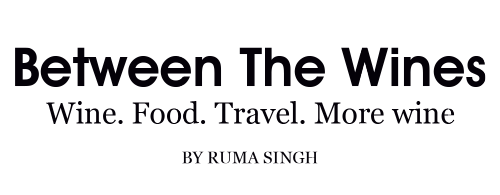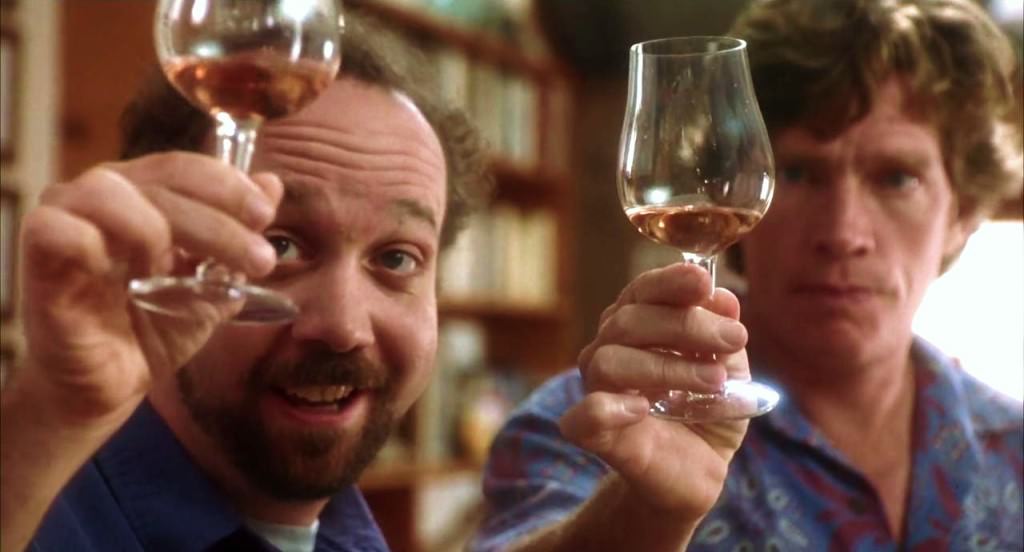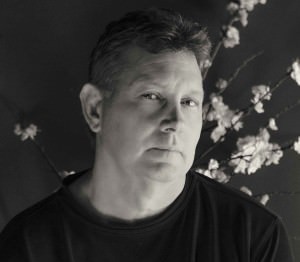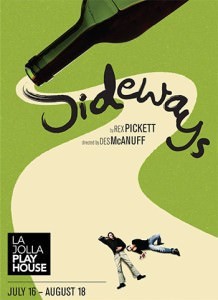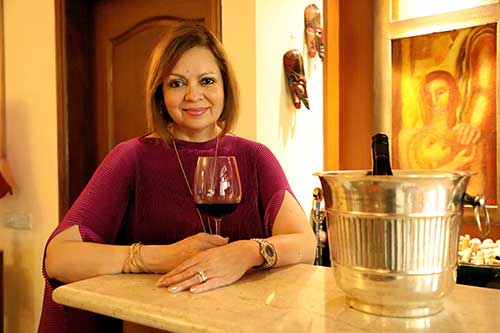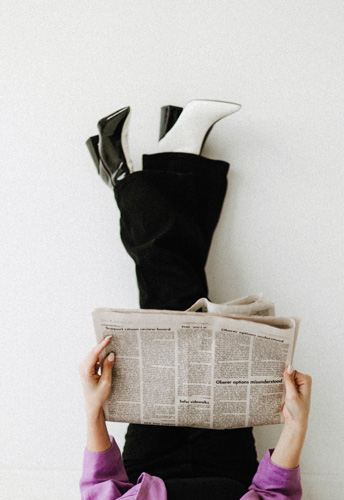Rex Pickett is the award-winning author of Sideways, the 2004 film that every wine buff has seen at least once; the film that toppled Merlot from its spot of #1 grape loved by Americans, and made Pinot Noir the new go-to wine of choice. As sales of Merlot wines dipped and those of Pinot soared, studies were done, debates commenced and the Merlot-loving American public scrambled to change allegiances. Was Miles right about Pinot Noir, the grape he called ‘haunting and brilliant and thrilling and subtle’?
Pickett’s road movie about two best friends on a wine journey in Santa Ynez went on to win an Oscar and innumerable other awards, and spawned a sequel, Vertical.
On Twitter, I’ve been following @RexPickett’s recent work – he is busy with Sideways:The Play and the third book of the series, which finds Miles and Jack in Chile, is due out shortly. I decided to catch up with the writer’s news, views and latest activities with a few questions, which he answered with his characteristic forthrightness.
Sideways changed the way America viewed Merlot and Pinot Noir. I have often wondered why you featured those two grape varieties in particular. Did you in any way foresee the historical pro-Pinot anti-Merlot wave that followed?
The answer to the latter question is no, of course not. I wrote a novel that I hoped got published. I had no idea it was going to be a movie. I did not do the adaptation. I had no idea what the writers were going to include and exclude. And I had no idea, once it was a film, that it would have that kind of seismic effect on the wine world.
Regarding Pinot Noir and Merlot: I fell in love with Pinot Noir. I think, as a red grape variety, it’s something entirely different than all the other red grape varieties. I love the aura of mystery that oenophiles seem to cloak it in, I love how it can produce rapturous and rhapsodic orations and prose. I love that it’s a difficult and fickle grape. Merlot is the opposite: approachable, rounder, less complex usually, easy-going. By the time I wrote the novel in ’99, Merlot had become an inside joke in the wine industry. Yes, there are great Merlots — Petrus, for example — but by ’99 it was nearly 20% of the red wine market in the U.S. It needed a correction. And, unwittingly, Sideways gave it to the Merlot producers. They earned it by over-cropping it, mechanize farming it and turning a once noble grape into a flabby, flavourless, characterless glass of swill.
So, from a literary standpoint, I look for conflict. In ’99 there was no greater conflict in the wine world than that between Pinot and Merlot. If you were in to the former you were hip, a wine geek. If you were in to the latter you were a Philistine and a wine moron. In ’99. Not anymore. I didn’t set up this conflict consciously, it’s just how it was. I loved Pinot, I thought it was a grape with the complexity of a great novel, and I thought Merlot had all the depth of a billabong.
Sideways became more than a road tale. As a film, it became the cult movie on wine for all wine lovers. They say there are autobiographical elements in it – to what extent? How happy or unhappy were you with what Alexander Payne and Paul Giametti did with the character Miles on celluloid?
I am extremely happy with Alexander Payne’s and Jim Taylor’s adaptation. They were incredibly faithful to my novel. In the film business, a novel like Sideways could have been two guys doing Jello shots in Cabo san Lucas; or in Bollywood, two guys guzzling Kingfishers in Punjabi. Once you sell your novel, you have no control over what happens to it. Though Giamatti bears no resemblance to me, he was the perfect Miles. As for whether the movie is autobiographical: it was written in the first person from the standpoint of Miles. I draw a lot from things in my life. There are many autobiographical elements in the novel/movie, but it is fiction. I draw on myself and others more for emotional states of mind and to paint a picture of their inner lives than I do to mine actual events. In that sense, it’s very autobiographical, I suppose.
Why did you choose the setting in Santa Ynez. Again, how autobiographical a choice is that?
I started going up to the Santa Ynez Valley in the early ’90s to get away from the disaster that was my life. I know the area very well. As a writer we’re always drawing from our lives — or at least I do in my work. I loved how it was unknown, unpopulated, not touristy at all. I loved that it was an inexpensive vacation, wine tasting was (then!) free. Very autobiographical.
Sideways has won innumerable awards, from Critic’s Choice awards to an Oscar. How did it affect the way you planned your sequels, if at all? Any pressures after this success vis-a-vis your writing ?
It didn’t affect anything. I write what I want to write. Pressure is when you are in debt, process servers are knocking at your door, and you’re still writing. Success maybe causes pressure in some, but for me it was liberating. Everyone hated Sideways when my agent went out with it. The publishing industry loathed it — over 100 rejection letters in three separate rounds of submissions. And Hollywood hated it as an unpublished book. It took a year before it got to Alexander Payne. Obviously, he didn’t hate it. Obviously, everyone else was wrong, if you measure success by all the awards it won — especially the Best Adaptation ones. As a result, when I write I don’t fear anyone or anything anymore. How could so many people be so wrong! Even today, 10 years since the film was made, people remember it like it was yesterday. They don’t recognize me, but if I say Sideways it’s like a light goes off in their head and their eyes bulge. It’s happened thousands of times. And, without Payne it would be an unpublished manuscript.
The sequel to sideways, Vertical, follows Miles (and Jack) travelling with his mother to Willamette Country. There is a lot more Pinot. How did the story line develop, post-Sideways?
It’s a long story. I wrote an original screenplay in ’93 titled The Road Back. It was a wheelchair-dependent mother/son road movie story. It sold, but was never made. When Sideways hit my then publishing agent was eager to do a deal. He suggested I novelize The Road Back. I didn’t want to. He twisted my arm. I signed on with a big publisher. The relationship soured. I morphed The Road Back into a Sideways sequel. That’s the short answer. The long answer is, well, too long. And too painful.
Part 3 of the series, I believe, is based in Chile. You have now moved out of the US. Can you give us a sneak peek as to what it is all about? What made you pick Chile as the backdrop? Are you considering more books, other regions, other characters to follow this?
ProChile (the government’s cultural arm) and Wines of Chile invited me to come down and research the possibility of writing a Sideways Part III in their country, no strings attached. So, I went. I fell in love with the country and their emerging wine industry. Fascinating place.
Sideways was, among other things, about failure. Vertical was about success. Sideways 3: Chile is about the other side of success, being rootless, looking for a home. It’s about love. It’s more contemplative than the other two novels. Less Bacchanalian, I suppose.
I would consider putting Miles and Jack in other regions, but my characters are ageing. I’m not writing senseless, mind-numbing crap like The Hangover, and then just recycling it. Or, at least I hope not. But, in all honesty, I’d like to move on. Chile will be the end, the end of the trilogy. But you never know. I’d be interested in taking them to China, maybe. Or, I don’t know, India. Some place exotic, and not what we would think of as wine-centric. I love Miles and Jack. They’re like my two best friends, in a way.
You said, ‘It’s easier to write a mediocre screenplay than a mediocre novel.’ Can you sum up the whole Hollywood experience with all its trappings of money and power and how it affected the telling of your story?
Hundreds, probably thousands, of books have been written on Hollywood and the experience of trying to make it as a writer or filmmaker or whatever there. And my take could be book length. In short: it’s a barbarous world. It’s teeming with charlatans and malevolently venal people, as well as really talented individuals. Though the former outnumber the latter by 10 to 1. Wherever there’s money, and wherever the money to be made is based on subjective products like filmed content you are bound to find both the worst and best in human beings and in human nature. I don’t wish that place on anyone. You have to have a true love for what you’re doing, but learn to be a pachyderm at the same time. If you go there with a two-year plan you’ve already sown the seed of failure. Miles in Sideways has seen enough of Hollywood to know that it can kill your soul to the quick. It has nearly killed him — in the novel, that is; in the movie they made him a school teacher trying to get a novel published. All he wants back is his soul.
Which director, after Alexander Payne, would you pick to do justice to the sequels, if you had a choice?
My ex-wife, Barbara Schock, won an Oscar in 2000 for Best Live Action Short, based on a script I wrote. She could do it justice. I’ve directed two feature films, albeit in the ’80s. I’d like to direct the sequels. Can’t think of anybody else who really is close to my, I’m told, sui generis sensibility. So, probably the answer to your question is: me.
We know about Miles’ wine story. Tell us a little about yours. What you like, when you started and what wine means to you now.
I enjoy all grape varieties. And I’m no snob. That’s for the affluent, and I’m really not into that one-upmanship kind of game that rich wine nerds play with one another. Look, anyone can have afforded to read the world’s literature and have developed a literary aesthetical sensibility, but to achieve the same in wine, it’s about status, class, and, yes, money. I hate that aspect about wine. Wine should be for everyone, but it’s not. The same way that not everyone can afford to drive an Aston-Martin, but maybe would like to, not everyone can afford a rare Burgundy, and thus wouldn’t be able to develop such a refined palate that someone who can afford to drink rare Burgundies would have the opportunity to develop. When developing a sensibility is in a plexus with exclusivity and privilege it makes me very angry. And, unfortunately, high-end wine, and developing a very refined palate, has that same kind of rarefied cachet that only money can buy.
I mostly sip and spit these days, and I drink the best that I can afford, and I disdain wine snobbery in every way, though I am definitely a believer in developing a palate, being passionate about whatever you do, and going as far as you can without bankrupting, or destroying, yourself.
For you, it’s now Sideways: The Play. How is it different this time around? What changes did you make if any, in the characters? How have you seen the play engage audiences differently from the book?
The play is based on my novel, not the movie, for legal and creative reasons. It’s a different medium, theater. Dialogue predominates and I could really cut loose in the play adaptation of my novel. The play follows the novel/movie pretty closely, but with new scenes, and quite a bit new dialogue. The play definitely gets more laughs than the movie — and, don’t get me wrong, I loved the movie. But the play is closer to my sensibility because, well, it is my sensibility, unfiltered, uncensored, unadulterated. Des McAnuff, who directed it at the La Jolla Playhouse expressed it best when he said succinctly, “I absolutely adored the movie, but the play is richer and more emotionally complex than the film.” Payne is a great writer/director, but he definitely saw the characters as more pathetic than I did. Maybe because I was one of the characters. I see them as flawed, but Jack in the movie is more of a dim bulb with a one-track mind. In the play he has a little more heart, a little more soul, like the real life person I based him on. The women, especially Maya, aren’t quite the wine geeks’ wet dream fantasies they are in the movie. The ending is more redemptive. Payne doesn’t like sentimentality. I don’t like mawkishness either, but I don’t mind sentimentality if it’s earned.
A final, personal query: We know Miles disdains Merlot. But it turns out that his favourite wine is a Cheval Blanc ’61, which he drinks in the end – a Merlot-dominated blend. Comment.
In the novel it was supposed to be an ’82 Latour, but Chateau Latour wouldn’t give the filmmakers the right to use their wine in the film, so Payne, who loves inside jokes and planting things in the frame a lot of times that have to do with contradictions and what he believed — and was right! — the film was about — namely: lying — had Miles’s coveted bottle be a Merlot/Cab Franc wine. It was totally intentional by Payne once he was forced to change the wine from Latour to something else.
